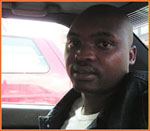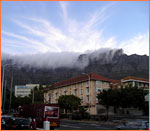 |
Tuesday, March 8, 2005
Rose Taxi picked me up at my friends' place in Saxonwold,
an affluent suburb of Johannesburg, to bring me to my first kwaito
interview. I was scheduled to meet Niq Mhlongo, author of the
"kwaito generation" novel Dog
Eat Dog, at his office in Newtown at noon. I still know
nothing about Johannesburg at this point, where anything is, what
roads lead to where. The cab driver was this ancient, white Afrikaaner
with a cane. I never learned his name. For some reason I want
to call him Arthur, maybe because he looks like the butler from
the Batman comics.
I showed him the address, Gwigwi Mrwebi Street. He'd never heard of it so he radioed dispatch. It turns out that a lot of the street names in Newtown have been changed to honor the contributions of various black South African performers and artists. Up until last September, Gwigwi Mwrewbi Street was called Pims Street. According to the City of Johannesburg's official web-site, the city sent out an appeal for responses to the new plan and received seventeen submissions. "Ten submissions opposed the renaming of Pim Street," it says, "stating that Howard Pim was 'an important personality in establishing and developing Newtown.'" Arthur had his own grumbling to do about the whole thing: "When they start changing the names after 140 years�" etc.
 |

Niq Mhlongo reading a passage from his novel Dog Eat Dog. |
Arthur asked me who I was going to see. A writer,
I told him. That makes sense, he said, describing Newtown as "artsy
fartsy." The particular street where Niq works, though, is a little
run down. Warehouses and lorries up past his office. A sign on
one of the buildings read "Stairs By Peter" and, underneath it,
"No Jobs." The interview was excellent. I wanted to talk to Niq
in particular because he was the first person whom I'd seen use
the phrase "kwaito generation." He used it in the essay he wrote
last year for the on-line writer's conference LitNet.
I called Rose Taxi to pick me up afterwards. And after about twenty minutes, Arthur rolled up to the curb again. He is the surliest cab driver I have ever met. He asked me how the interview went and I told him that it went great, that Niq had a lot of interesting things to say and that he was really smart. "Black guy," Arthur said, as though he found it hard to believe. Yes, I said, his books getting great reviews - he's kind of the darling of the critics. "Oh you mean he can't go into a hat shop," Arthur said. (I'm paraphrasing here.) "What's that?" I said.
"You mean he can't go into a hat shop," he said again.
"How do you mean?" I said.
"Well," Arthur said, "Because if he buys a hat now, in a year it won't fit him because his head will be all swelled up."
 |
| Table Mountain |
Somehow the subject changed to Capetown, from where I'd just returned.
It's gorgeous there, though white and black people have very different
opinions of it. I was told that all the white people live on the
front side of Table Mountain - this beautiful flat-topped edifice
with a cloud forever clinging to its scalp and foaming over the
edge - whereas all the black people live on the other side of the
mountain where it just looks like an ugly, sheer wall. I was told
that black people are completely cut off from the rest of the city,
that Capetown is one of the, if not the, most segregated parts of
South Africa. I heard that one person even called a local Capetown
public affairs radio show to advocate for tearing Table Mountain
down. The white people I talked to in South Africa all said Capetown
was "beautiful." The black people used a different word: "disgusting."
Except, of course, for Arthur, who's white and who really doesn't like anything it seems. "The best part about visiting Capetown," he said "is the road home. The Joneses only talk to the Smiths and the Smiths only talk to God. They're all snobs there."
Back in Saxonwold, he handed me his card and said I could ask for him specifically if I wanted to. "103," he said "that's my number not my age."
NEXT ENTRY >>
|
 |





















